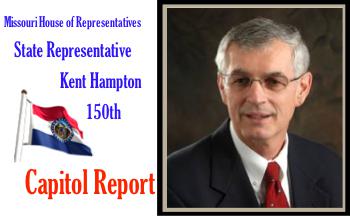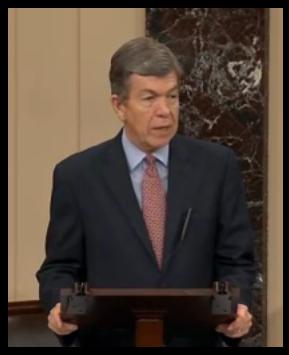
Submitted by
Dee Loflin, SMT Manager/Writer
Jefferson City, Missouri - I want to welcome my legislative assistant, Shana Beasley, back to the Capitol and welcome her daughter Quinn Elimarie Beasley into the world. Quinn was born on April 3rd.
Interim has officially started at the Capitol and things have seemingly slowed down, at least on the House floor. Although there is always plenty going on in the district to keep us busy, and we are always more than happy to assist our constituents in any way we can. This week’s Capitol Report begins our “This Day in History Series” that we will continue throughout Interim.
THIS WEEK IN HISTORY:
On June 5, 1933, the United States went off the gold standard, a monetary system in which currency is backed by gold, when Congress enacted a joint resolution nullifying the right of creditors to demand payment in gold. The United States had been on a gold standard since 1879, except for an embargo on gold exports during World War I, but bank failures during the Great Depression of the 1930s frightened the public into hoarding gold, making the policy untenable.
Soon after taking office in March 1933, Roosevelt declared a nationwide bank moratorium in order to prevent a run on the banks by consumers lacking confidence in the economy. He also forbade banks to pay out gold or to export it. According to Keynesian economic theory, one of the best ways to fight off an economic downturn is to inflate the money supply. And increasing the amount of gold held by the Federal Reserve would in turn increase its power to inflate the money supply. Facing similar pressures, Britain had dropped the gold standard in 1931, and Roosevelt had taken note.
On April 5, 1933, Roosevelt ordered all gold coins and gold certificates in denominations of more than $100 turned in for other money. It required all persons to deliver all gold coin, gold bullion and gold certificates owned by them to the Federal Reserve by May 1 for the set price of $20.67 per ounce. By May 10, the government had taken in $300 million of gold coin and $470 million of gold certificates. Two months later, a joint resolution of Congress abrogated the gold clauses in many public and private obligations that required the debtor to repay the creditor in gold dollars of the same weight and fineness as those borrowed. In 1934, the government price of gold was increased to $35 per ounce, effectively increasing the gold on the Federal Reserve's balance sheets by 69 percent. This increase in assets allowed the Federal Reserve to further inflate the money supply.
The government held the $35 per ounce price until August 15, 1971, when President Richard Nixon announced that the United States would no longer convert dollars to gold at a fixed value, thus completely abandoning the gold standard. In 1974, President Gerald Ford signed legislation that permitted Americans again to own gold bullion.
A shout out to the Holcomb Hornets baseball team for capturing 3rd place in 2a State!
As always, it is an honor to serve you in the Missouri House. If you would like to discuss any issue, please call 573-751-3629. You can also email me at Kent.Hampton@house.mo.gov. I look forward to hearing from you.


Submitted by
Dee Loflin, SMT Manager/Writer
Jefferson City, Missouri – Gov. Jay Nixon has ordered that the U.S. and Missouri flags at state buildings in all 114 counties and the City of St. Louis be flown at half-staff on May 25 to honor the bravery and sacrifice of Sergeant First Class Trenton L. Rhea.
Sergeant First Class Rhea, age 33, of Kansas City, was a soldier in the United States Army serving in support of Operation Enduring Freedom in Afghanistan. He died on May 15 while serving his country in Kandahar Province, Afghanistan.
In addition, Gov. Nixon has ordered that the U.S. and Missouri flags at all state buildings in Clay County be flown at half-staff from May 26 – May 31.
“Sergeant First Class Rhea served our country with bravery and dedication as a soldier in the United States Army, and I ask all Missourians to remember his sacrifice when they see the lowered flags,” Gov. Nixon said. “Our thoughts and prayers are with his family as they mourn.”
Sergeant First Class Rhea was assigned to the 603rd Military Police Company, 530th Military Police Battalion, 300th Military Police Brigade, 200th Military Police Command, U.S. Army Reserve, Belton, Missouri.
His awards and decorations include the Bronze Star Medal, Army Commendation Medal (2 awards), Army Achievement Medal (2 awards), Army Reserve Components Achievement Medal, National Defense Service Medal, Afghanistan Campaign Medal with Bronze Service Star, Iraq Campaign Medal with Bronze Service Star, Global War on Terrorism Expeditionary Medal, Global War on Terrorism Service Medal, Armed Forces Reserve Medal with M Device (3 awards), Noncommissioned Officers Professional Development Ribbon, Army Service Ribbon, Overseas Service Ribbon (3 awards), Army Reserve Components Overseas Training Ribbon, NATO Medal, Combat and Special Skill Badge Basic Marksmanship Qualification Badge (Bar, Weapon: Rifle (Inscription: Rifle), Expert), Driver and Mechanic Badge (Bar, Driver-W), Joint Meritorious Unit Award, Army Superior Unit Award, and the Overseas Service Bar (3 awards).
Our thoughts and prayers to his family during this difficult time.

Submitted by
Dee Loflin, SMT Manager/Writer
Washington D.C. – U.S. Senator Roy Blunt (Mo.) spoke on the Senate floor today to send his prayers to the tornado victims in Moore, Okla. and to mark the anniversary of the devastating tornado that tore through Joplin, Missouri two years ago.
Blunt also praised the tremendous and ongoing rebuilding efforts in Joplin, including a $20 million grant awarded to the City of Joplin to revitalize the 20th Street Corridor.
The grant, which was awarded today by the U.S. Economic Development Administration (EDA) through the FY2012 Disaster Relief Opportunity, supports construction of a new public library and a community resource center.
“Two years after the devastating Joplin tornado, we’ve witnessed remarkable rebuilding and recovery efforts across the region,” Blunt said. “I’m thankful Joplin received this grant, which will continue to revitalize the community and spur new economic development opportunities in the City’s 20th Street Corridor.”



